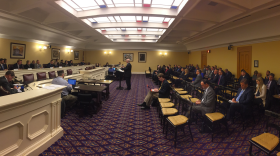Republican Ohio House Speaker Larry Householder was arrested Tuesday in connection with a 60 million dollar corruption, racketeering and conspiracy case.
Four other political operatives were also arrested. Ohio Public Radio's Jo Ingles and Andy Chow prepared this report.
U.S. Attorney David DeVillers says Householder and the operatives who worked with him, including former state Republican Party Chair Matt Borges, were part of a major scheme of corruption and refers to it this way:
"What is likely the largest bribery, money laundering scheme ever perpetrated against the people of the state of Ohio."
In addition to Householder and Borges, Columbus lobbyists Juan Cespedes and Neil Clark were arrested. Clark is known for his advocacy for the now-closed online charter school ECOT. Jeff Longstreth, Householder’s campaign and political strategist, was also arrested.
DeVillers says this team of people used money from a yet to be named company to do three things.
"One to line the pockets of the defendants, two to build a power base for Larry Householder and three to further this conspiracy, that is to further the conspiracy, that is to further the affairs of this enterprise."
DeVillers says Householder used a half a million dollars went to his personal benefit, including money to pay off a lawsuit and legal fees and for a house in Florida.
DeVillers, who was appointed by Donald Trump, says Team Householder used millions of dollars to elect a slate of candidates and attack their rivals. The FBI’s Special Agent in Charge of the investigation, Chris Hoffman, says the charges against Householder break new ground.
"This is the first time the racketeering charge has been used on a public official in the Southern District of Ohio."
DeVillers says the money was funneled through Generation Now, a corporate entity registered as a 501 (c)(4) social welfare organization. It’s also named in the suit.
"Make no mistake. These allegations were bribery, pure and simple. This was a quid pro quo. This was pay to play."
DeVillers says this investigation is continuing and won’t rule out future arrests in connection with this case. The FBI is encouraging anyone with any information they think could be helpful to contact them. But DeVillers says there is no evidence Gov Mike DeWine is involved in this case.
DeWine said it’s a sad day for Ohio and he’s deeply concerned about the allegations, and he called on Householder to resign. And some Ohio lawmakers are now calling for a repeal of that nuclear energy bailout.
House Bill 6 is the sweeping energy bill that not only created a ten year $1.5 billion dollar subsidy for Ohio’s two nuclear power plants by increasing everyone’s electric bills. It also created subsidies for struggling coal plants, rolled back pro-renewable energy policies, and eliminated energy efficiency standards.
DeVillers: "We are not commenting on the wisdom of House Bill 6."
That's U.S. District Attorney David DeVillers who says HB6 is at the center of the federal public corruption case against Householder and the four other defendants.
DeVillers: "It's clear from the affidavit that House Bill 6 was passed with millions of dollars, tens of millions dollars that were hidden from the people of the state of Ohio."
But the bill was a hotly contested piece of legislation in 2019.
Two of the defendants, Matt Borges and Juan Cespedes, were both registered lobbyists for FirstEnergy Solutions, the energy generation company that owns Ohio's two nuclear power plants. It was renamed Energy Harbor when it came out of bankruptcy earlier this year.
Cespedes pushed for the bill, while Borges' consulting company helped fight back against a petition to repeal the law after it was passed.
Neil Clark, another defendant in the case, is a longtime Columbus lobbyist who's gained a high-profile fighting for legislation that benefits payday lenders and for the now-closed online charter school, ECOT.
But Clark did not have a strong public presence at the Statehouse on HB6.
Environmental groups, free market conservative advocates, and natural gas companies advocated against the bill. Some of those opponents are now calling on lawmakers to return to the Statehouse to repeal the law.















